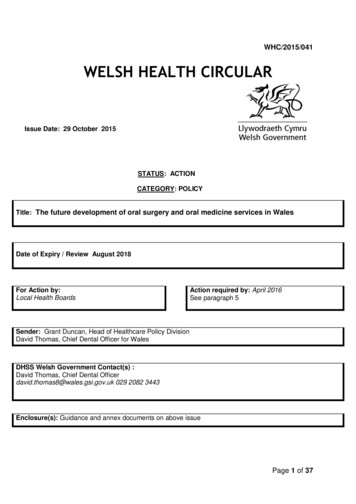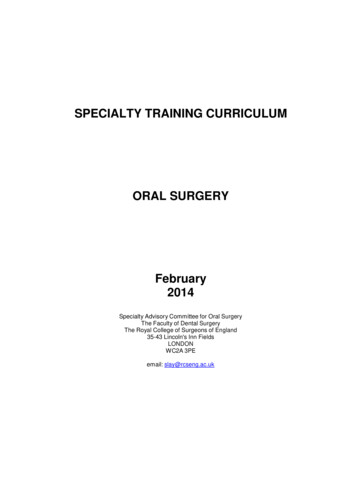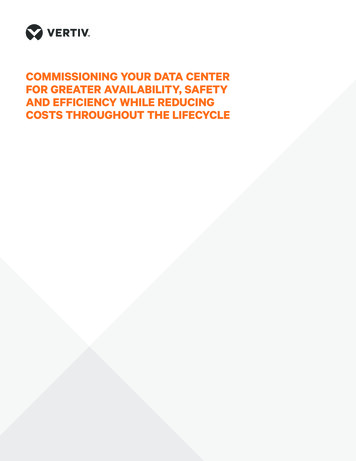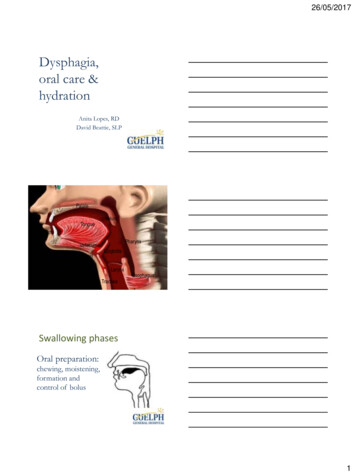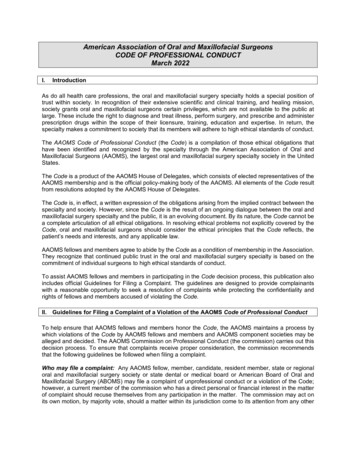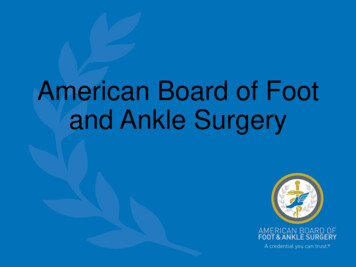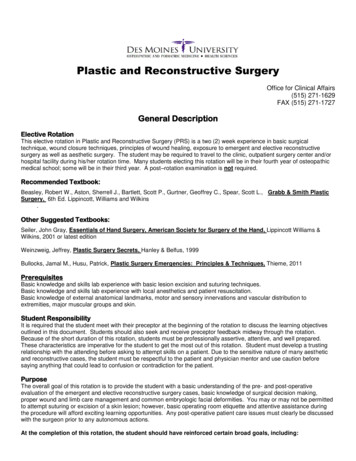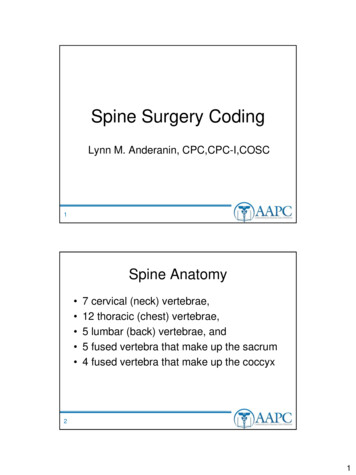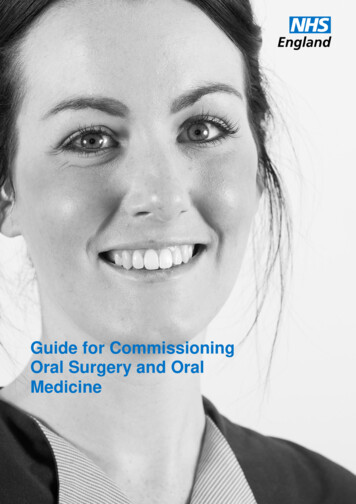
Transcription
Guide for CommissioningOral Surgery and OralMedicine1
CLASSIFICATION: OFFICIALNHS England INFORMATION READER BOXDirectorateMedicalNursingFinanceCommissioning OperationsTrans. & Corp. Ops.Publications Gateway Reference:Patients and InformationCommissioning Strategy03083Document PurposeGuidanceDocument NameGuide for Commissioning Oral Surgery and Oral Medicine SpecialtiesAuthorResource Author – NHS England, Chief Dental Officer teamPublication Date29 September 2015Target AudienceNHS England Dental CommissionersAdditional CirculationListDental Public Health Team, Local Dental Network, Local DentalCommittees, Clinical Directors CDS, Health Education England DentalLeads, Dental Schools Deans, Local Authority Directors of PublicHealth, British Dental Association Leads, National Dental Associationsand Organisations, NHS England Regional DirectorsDescriptionThis document is to be used by commissioners to offer a consistent andcoherent approach. They describe the direction required to commissiondental specialist services. They will improve dental care and outcomesfor patients, ensure they receive the highest quality dental care in themost appropriate setting, by professionals with the required skills, whilstensuring value for money.Cross ReferenceThis is part of a suite of documents including; Guide for CommissioningSpecialist Dentistry Services Introduction, Guide for CommissioningOrthodontics, Guide for Commissioning Special Care Dentistry,Equality & Health Inequalities supplementSuperseded Docs(if applicable)Action RequiredTiming / Deadlines(if applicable)Contact Details forfurther information00By 00 January 1900Dionne HiltonArea 6 BSkipton House, 80 London RoadLondonSE1 6LH07919 573 3820Document StatusThis is a controlled document. Whilst this document may be printed, the electronic version posted onthe intranet is the controlled copy. Any printed copies of this document are not controlled. As acontrolled document, this document should not be saved onto local or network drives but shouldalways be accessed from the intranet.2
Contents1Foreword . 52Equality and Health Inequalities Statement . 63Executive Summary . 74Introduction . 105 Description of the specialties . 115.1Oral Surgery & Oral Medicine . 115.2Related specialties . 115.3Description of the current national picture. 115.4Description of training and the current workforce . 125.5Description of the complexity levels . 156 Summarised Illustrative Patient Journeys . 206.1Oral Surgery . 206.2Oral Medicine . 217Commissioning Oral Surgery & Oral Medicine services . 228 Understanding need and current service provision . 248.1Local population profile . 248.2Needs assessment data specific to the commissioning of Oral Surgery andOral Medicine specialist services . 248.3Tools which enable more precise Oral Surgery and Oral Medicine needsassessment . 278.4Service analysis . 288.5Oral Surgery and Oral Medicine referrals . 339 Transforming Oral Surgery & Oral Medicine services . 389.1Current models and challenges . 389.2Workforce implications . 399.3Service redesign . 4110Illustrative journey of a patient (elective Oral Surgery care) . 4411Illustrative journey of a patient (Oral Medicine) . 541212.1Procuring Oral Surgery & Oral Medicine services . 63Minimum standard specification . 6313Quality and outcome measures . 6813.1 Quality and Outcome Key Assessment Areas . 6813.2 Oral Surgery and Oral Medicine Patient reported Experience Measures(PREMs) . 6913.3 Patient Reported Outcome measures (PROMs) . 6913.4 Clinical Outcome Measures . 7213.5 Value and Impact . 7213.6 Quality Assurance . 731414.114.214.3Contracting . 75Regulation. 75Enablers for delivery . 76Minimum standard data collection and reporting . 7615Next steps. 81Appendix 1 – Membership of the Oral Surgery and Oral Medicine WorkingGroup . 823
Appendix 2 – Glossary of Terms . 83Appendix 3 – Oral Surgery Specialty Training Learning Outcome90. 87Appendix 4 – Outcomes91 . 88Appendix 5 – Competency Framework for Oral Surgery practitioners . 89Appendix 6 – Specialist Dental Services Referral Form Examples . 91Appendix 7 – Example of Primary Care-Based Specialist Oral Surgery Services. 92Appendix 8 – Example of Transformation of Services . 95Appendix 9 – Coding used by Secondary Care Oral Surgery/OMFS departments. 974
1 ForewordNHS England produced the Five Year Forward View to set out a shared view of thechallenges ahead and the choices about health and care services in the future; itapplies to all services including dentistry.This consensus on the need for change and the shared ambition for the future is thecontext in which these Commissioning Guides for Dental specialties have beenproduced. Clinicians, commissioners and patients have contributed to this work todescribe how dental care pathways should develop to deliver consistency andexcellence in commissioning NHS dental services across the spectrum of providersto benefit patients.In order to deliver this vision and implement the pathway’s a coalition of the willing’,NHS England partners, HEE and PHE, specialist societies and others who havecontributed to their development will need to respond in the implementation phase byunlocking structural and cultural barriers to support transformational change in dentalservice delivery.It’s a future that will dissolve the artificial divide between primary dental care andhospital specialists; one that will free specialist expertise from outdated servicedelivery and training models so all providers can work together to focus on patientsand their needs.These guides set out a framework and implementation and the pace of change willvary across England. This will be an iterative process; therefore, it will be necessaryto review and update these guides regularly. However, implementation will requireenergy, brave decisions and momentum, together with a willingness to share, goodpractice, innovation and learning, as it emerges, to accelerate the speed and impactof change to improve patient care.5
2 Equality and Health Inequalities StatementPromoting equality and addressing health inequalities are at the heart of NHSEngland’s values. Throughout the development of the policies and processes cited inthis document, we have: Given due regard to the need to eliminate discrimination, harassment andvictimisation, to advance equality of opportunity and to foster good relations betweenpeople who share a relevant protected characteristic (as cited under the Equality Act2010) and those who do not share it; and, Given regard to the need to reduce inequalities between patients in access to,and outcomes from, healthcare services and to ensure services are provided in anintegrated way where this might reduce health inequalities.6
3 Executive SummaryIt is now widely recognised that the NHS needs transformational change to services,in order to deliver better outcomes for patients and to ensure that we commissioneffectively.Progress has been made in improving oral health and access to services in general.However, inequality in oral health experience and inequity in access to primary andspecialist care exists. These guides focus on the commissioning and delivery ofspecialist care pathways; however, the gateway to specialist care relies on access toefficient and effective primary dental care services. Whilst there has been someimprovement in general access over the past few years, commissioners need toensure that they continue to meet their duties to commission primary care servicesappropriate to the needs of their populations. This mean making effective use ofavailable resources by challenging primary care providers to deliver care to thosewho need it most and by adopting appropriate recall intervals for those who can beseen less frequently, freeing capacity for access by new patients. Achievingimprovements in access to primary care will widen access to specialist care for thosewho need it.NHS England has developed these guides for commissioning dental specialties to beused by commissioners to offer a consistent and coherent approach. They describethe direction required to commission dental specialist services. This will reflect theneed and complexity of patient care and competency of the clinician required todeliver the clinical intervention rather than the setting within which the care isdelivered. Care will be delivered via a pathway approach which will provide clarityand consistency for patients, the profession and commissioners. There will benationally agreed minimum specifications for each service, including how quality andoutcomes are to be measured, which can be enhanced locally.They will ensure there is national consistency in the NHS commissioning offer fordental specialist services and how they are delivered. The pathway will also provideconsistency across England in agreeing at a national level as much of the detailaround commissioning, such as referral criteria, core data set required on referral,quality of environment and equipment, contractual frameworks etc. as well asconsistent measures of quality and outcomes. The frameworks describe the conceptof clinical engagement and leadership through Managed Clinical Networks (MCNs)which will work closely with commissioners, Dental Local Professional Networks(LPNs) and describe and monitor the patient journey from primary to specialist care.The first phase of this work during 14/15 has included developing frameworks for thefollowing specialties: Orthodontics, Special Care Dentistry, Oral Surgery/OralMedicine and Restorative dentistry. Further work on restorative mono specialties,Paediatric Dentistry and Supporting Specialties (Dental and Maxillofacial Radiology,Oral Microbiology and Oral and Maxillofacial Pathology) will follow.NHS England is committed to working and engaging with patients, carers and thepublic in a wide range of ways. Throughout this process we have ensured thatpeople’s views are heard through having patient representatives on every group andby convening a patient review group who have helped us develop the content. This isoutlined in detail in the patient engagement and stakeholder engagementappendices.7
Moreover, it must be understood that ultimately it is the patient who should make thedecision about what treatment, if any, to undergo. The practitioner’s role is to adviseon treatments and options, and benefits and risks. This discussion between patientand practitioner should form the beginning of every patient journey and everyspecialist care pathway. That includes patient consent to the information sharingneeded for their journey along a pathway.The process of developing these patient involvement frameworks has also includedengagement with every stakeholder group that has an interest in dentistry, asoutlined in the acknowledgments, stakeholder engagement appendix andgovernance model in the appendices.This is the beginning of a process. Locally, commissioners need to undertake workto understand the specialist services that are currently being provided, by who andwhere. The quality and quantity of those services, together with the impact and cost,also need to be identified before any change or procurement takes place. Manycommissioners and clinician have already made progress on aspects of thisapproach locally. However, they need to measure themselves against enablerswithin each of the guides to understand what needs to happen next and agree localpriorities. Commissioners will need support to identify current dental resources sodecisions can be made to ensure flexibility. For example, establishing MCNs mayrequire investment or flexibility in contracting, such as the use of Commissioning forQuality and Innovation Payments (CQUIN). The work of developing thecommissioning guides has identified a number of examples of innovative solutionsand exploiting flexibility in current contracting forms. Locally, commissioners willneed to consider investment and contractual flexibility to support the implementationof new care pathways. The implementation of care pathways could deliver efficiencygains in some areas; however, there may be a need to consider the use of thesesavings as investment to pump prime change in other areas of dentistry. The nextphase of this work could support the validation and sharing of solutions to harnessand communicate examples of good practice and innovation. Some of the identifiedenablers will be more difficult to implement at a local level; however, nationally, NHSEngland could support identified enablers to become a reality. An example would beexpanding the use of the NHS number within dentistry.There will be a particular emphasis on helping commissioners understand thefinancial impact of implementing the commissioning guides, by providing an estimatefor the associated upfront costs along with any expected financial savings to theNHS. The initial work will involve needs assessment, understanding currentprovision, enabling consistent data collection and coding. Implementation support willalso include the development of a commissioning pack to encourage effective andconsistent commissioning to benefit patients. Work on an additional set of guides willalso take place during this phase, focusing on Paediatrics, the Supporting Specialties(Dental and Maxillofacial Radiology, Oral Microbiology, Oral and MaxillofacialPathology) and further detail on Restorative mono-specialties (Endodontics,Periodontics, Prosthodontics).The implementation phase will include supporting commissioners to identify whatcould and should be undertaken nationally or regionally and what should besupported by the Commissioning Support Unit locally. However, the first steps forcommissioners on publication of these first four strategic specialist commissioningguides will be to review current local progress against the frameworks and pathways,8
to assess local priorities, and agree what enablers need to be put in place, such asestablishing clinical networks and referral processes.Commissioners need to be aware that the effective implementation of needs-leddental specialist care pathways relies on maintaining and ensuring access toeffective primary dental care services, particularly for those groups in the populationwho do not access care routinely or have additional needs. Publishing these guidesis the first step in what is intended to be an iterative process. Commissioners whoneed to procure services in this transition can use the guides to complete needsassessment, set minimum standards and service direction and ensure that proposedoutcomes and quality measures are included in service specifications. The guides,including the overarching introductory framework, can be made available to potentialbidders. Tendering providers will need to include a statement in their submissions onhow they will work with commissioners to comply with the requirements of the guides.Commissioning the new pathways is intended to ensure improved access, quality ofcare and patient outcomes.9
4IntroductionThis document is intended as a guide for the appropriate commissioning ofspecialist Oral Surgery and Oral Medicine services. It provides a description ofthe services, including the current national picture in terms of where services arebased and details of workforce and training. A summarised illustrative patientjourney is provided to enable commissioners to understand Oral Surgery andOral Medicine clinical pathways. Sources of available information that enablelocal needs assessment and understanding of local current services provisionare described. Service transformation is considered, including the implications ofservice redesign on the workforce. A minimum standard specification for theprocurement of specialist Oral Surgery and Oral Medicine services is presented.Outcome measures that assess clinical outcomes, patient safety and patientreported outcomes (experience) are described to enable quality of services to beassessed and reviewed.10
5Description of the specialties5.1Oral Surgery & Oral MedicineThe specialty of Oral Surgery deals with the diagnosis and management of pathologyof the mouth and jaws that requires surgical intervention. Oral Surgery involves thetreatment of children, adolescents and adults, and the management of dentallyanxious and medically complex patients. Oral Surgery care is provided by OralSurgeons and by Oral & Maxillofacial Surgeons as the clinical competencies of thesetwo specialties overlap. The UK General Medical Council recognises ‘Oral &Maxillofacial Surgery’ as a medical specialty.Oral Medicine involves diagnosis and non-surgical oral health care management ofpatients with chronic, recurrent and medically related disorders of the mouth andassociated structures5.2Related specialtiesOral & Maxillofacial Surgery (OMFS) is concerned with the diagnosis and treatmentof diseases affecting the mouth, jaws, face and neck. This medical specialty isunique in requiring an undergraduate qualification in both medicine and dentistry andis often seen as a bridge between the two, as OMFS specialists treat conditions thatrequire expertise from both backgrounds. Consultants in OMFS are trained in allareas of practice within the specialty (including the management of Oral Surgery andoral medicine conditions) and many develop sub-specialist interests in more than onefield.Dental & Maxillofacial Radiology, Oral & Maxillofacial Pathology and OralMicrobiology are involved in Oral Surgery and Oral Medicine patient pathways.5.3Description of the current national picturePrimary care-based General Dental Practitioners (GDPs) are expected to undertakeroutine Oral Surgery care, such as dental extractions, as part of their general dentalservices contracts. More complex Oral Surgery care is provided by specialists in OralSurgery and by Oral Surgery and Oral & Maxillofacial Surgery consultants (includingacademics) who may work in primary care or secondary care settings1. Secondarycare-based Oral Surgery consultants would not normally be found in stand-aloneunits; rather, they would be integrated with OMFS units with the opportunity for skillmix and multi-disciplinary team working. Postgraduate dental trainees working underconsultants may also provide Oral Surgery care.Oral Medicine clinicians are employed either by the NHS or by Universities, the lattertypically being employed with an honorary status. Access to academic units offeringOral Surgery and Oral Medicine services is not readily available in all areas of thecountry. Typically, Oral & Maxillofacial Surgery units in General Hospitals mayprovide these services.Given the overlap between Oral Surgery, Oral & Maxillofacial Surgery and OralMedicine, the workforce within local areas may comprise a variety of performers from1Kendall N. Improving access to Oral Surgery services in primary care. Primary Dental Care 2009; 16(4): 137-142.11
different specialties. Depending on the decisions and information provided by thereferring clinician, patients with similar Oral Surgery/ Oral Medicine conditions maybe seen by a specialist in Oral Surgery, Oral & Maxillofacial Surgery or OralMedicine. It is important that commissioners can identify which specialists areproviding which services locally.A significant proportion of referrals made to Oral Surgery specialists includedentoalveolar surgery2 and this less complex work has caused increasing pressureon hospital consultant service waiting lists since the dental contract reforms in 2006.The recent Medical Education England Dental Programme Board Review of OralSurgery Services and Training recommended that much of the minor Oral Surgerycare could be delivered by specialists; some specialists have established primarycare-based Oral Surgery services which are commissioned locally (See Appendices7 & 8). Forceps extraction and some minor Oral Surgery is undertaken in primarycare by GDPs. Some dentists, who are not on the GDC specialist list for OralSurgery, have enhanced skills and experience in Oral Surgery (and have previouslybeen called, ‘Dentists with a Special Interest’, DwSI). These individuals may performsome Level 2 procedures within an MCN.Information regarding activity is presented in Section 8 of this document. It isimportant to note that data are not consistently collected across all areas of England.However, general trends in activity may be identified when comparing different datasources.5.4Description of training and the current workforceThe General Dental Council (GDC) describes the learning outcomes that dentalprofessionals need to demonstrate by the end of their training to facilitate registrationand approves the specialist training curricula for each of the thirteen dentalspecialties.5.4.1 The Oral Surgery and Oral & Maxillofacial specialtiesSince the 1980s, Oral Surgery, as practised both in the acute sector and DentalTeaching Hospitals, transformed into ‘Oral & Maxillofacial Surgery’ (OMFS) with arequirement for both undergraduate medical and dental training and appropriatespecialist training. Clinical practice broadened to encompass diseases affecting theface and neck as well as the mouth and jaws. A training programme that excludedundergraduate medical training and the surgical management of oral malignancy waspreserved for some academic surgeons. This Academic Oral and MaxillofacialSurgery programme has now been superseded by Integrated Academic TrainingProgrammes. Oral & Maxillofacial Surgery became a recognised medical specialty in1994.Oral Surgery was re-introduced in the UK as a dental specialty regulated by theGeneral Dental Council in 2009. It is an EU recognised dental specialty with EUprovision for the mutual recognition of specialist training when consideringapplications from EU nationals for admission to the GDC specialist Oral Surgerylist.342Coulthard P, Kazakou I, Koron R, Worthington HV. Referral patterns and the referral system for oral surgery care. Part 1:General dental practitioner referral patterns. British Dental Journal 2000;188:142-145.3European Union Directive 78/686/EEC, 1978.12
Given that Oral Surgery is a relatively new specialty, some clinicians on the GDCSpecialist List may not have completed the classical training pathway. Additionally, atthe present time, a quality assured training pathway and assessment does not existfor Level 2 clinicians for example SAS grades. This is a transition period so, in thefuture, with appropriate needs assessment, there may be a requirement for training.This will require the identification of appropriate funding and development of atraining programme to benchmark skills and competence nationally. There will needto be a robust process in place to assess the competencies of dentists providing thiscare. There may also be a need to redress the balance with respect to nationallyavailable dental specialty training posts.5.4.2 Oral SurgeryThe Oral Surgery specialist training curriculum has been developed from the JointCommittee for Specialist Training in Dentistry Specialist Advisory Committee (SAC)for Oral Surgery Guidelines for the UK. Oral Surgery is one of two dental specialtiesrecognised by the EU and is a dental specialty regulated by the GDC and the trainingcurriculum is defined.5 Oral & Maxillofacial Surgery is a medical specialty regulatedby the General Medical Council with a defined training curriculum.6The three year specialist Oral Surgery training programme describes the knowledge,skills and attitudes required to be a specialist and for holding a certificate ofcompletion of speciality training (CCST). 7 , 8 The learning outcomes include areassuch as: management of oral infections; removal of teeth/impacted teeth andmanagement of related complications; peri-radicular surgery; biopsy techniques andtreatment of intra-oral benign and cystic lesions of hard and soft tissues;management of benign salivary gland disease by intra-oral techniques and familiaritywith the diagnosis and treatment of other salivary gland diseases; insertion of dentalimplants including bone augmentation and soft tissue management; management ofdentoalveolar trauma; management of orofacial pain including temporomandibularjoint disorders; and diagnosis of oral cancer and dentofacial deformity. Appropriatepain and anxiety control including the use of conscious sedation techniques isanother key requirement. Appendix 3 lists Specialty Training Learning Outcomes forOral Surgery.On successful completion of the training programme, and having passed theIntercollegiate Membership Oral Surgery examination, an application can be madefor the award of a Certificate of Completion of Specialist Training (CCST) and entryto the GDC’s List of Specialists in Oral Surgery.Substantive and Honorary UK Consultants in Oral Surgery have usually completedthe Intercollegiate Specialty Fellowship Examination (ISFE) and they possess clinicalcompetencies that differentiate them from a Specialist, which include: themanagement of jaw and facial fractures; congenital and acquired jaw anomalies;4European Union Directive 2001/19/EC. Official Journal of the European Communities. L206, 31.07.2001General Dental Council (2010). Oral Surgery Curriculum. Available at uary%202014.pdf. AccessedFebruary 20156http://www.gmc-uk.org/Oral and Maxillofacial Surgery Syllabus 01.pdf 30538196.pdf7The Royal College of Surgeons (2009). The Specialty of Oral Surgery. The Board of the Faculty of Dental Surgery. The RoyalCollege of Surgeons of England, 35-43 Lincoln's Inn Fields, London, WC2A 3PE8Specialist Training Committee. Oral Surgery. 2010 Specialty Advisory Committee in Oral Surgery The Faculty of DentalSurgery. The Royal College of Surgeons of England, 35-43 Lincoln's Inn Fields, London, WC2A 3PE.513
advanced oral implantology and bone augmentation; diagnosis and treatment ofanomalies and diseases of the TMJ; and, diagnosis and treatment of salivary glanddiseases. These individuals also have training in management of healthcaredelivery 9 , competencies in research and/or critical appraisal competency and aretherefore appropriately qualified to lead a MCN. Staff grade and associate specialists(SAS grade clinicians) may undertake this complex clinical work within amultidisciplinary team; however, these grades are now closed to new entrants.In the future, consideration could be given for existing SAS grades to have theopportunity to undertake further career development and training (e.g. ma
Guide for Commissioning Oral Surgery and Oral Medicine Specialties Superseded Docs (if applicable) Contact Details for further information . to review and update these guides regularly. However, implementation will require energy, brave decisions and
